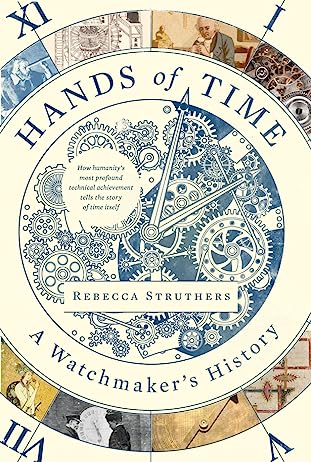Horology. Did you know what that was before listening to this episode with author, watchmaker and restorer Rebecca Struthers. I know I didn’t! And now I’m completely fascinated. Host Russ Roberts welcomed Struthers to talk about her new book, Hands of Time, but as usual the conversation spanned much, much more.

I learned that there are not enough restorers to meet demand (the market for repairs repairs is fine), and that watchmakers exemplify the blurry distinction we like to think of between competition and cooperation. And while I’ve seldom paid much mind to watches as more than a fashion accessory, I would now love to visit the basement room in the British museum filled with them. What treasures! (I also loved Struthers’ characterization of museums as like icebergs.)
Now we’d like to hear what you have to say. Join us in the comments, or use the prompts below to start your own conversation offline.
1- Struthers describes for Roberts how John Harrison solved the longitude problem. What was the problem, and why was it so difficult to solve? (Hint: it may have involved cats!)
2- Roberts describes Adam Smith’s pin factory for Struthers and asks her to relate it to the history of watchmaking. Struthers described how Dutch watch forgers revolutionized production, availability, and price.
Why didn’t Smithian style division of labor take off in the Netherlands? What happened in the United States instead? To what extent does this contradict Smith’s account that the workers involved in a production process are the most likely to find opportunities for greater specialization?
How did the Swiss usher in yet another new wave of division of labor by choosing not to fight against American mass production (as did the British)? How did this Swiss revolution change the fashion of watches?
3- How has the history of watches changed the way we think about time? Do you regard these changes as net positive or negative? Explain.
4- Roberts reads another quote from Smith, this time from The Theory of Moral Sentiments, before he and Struthers discuss the famous watch created for Marie Antoinette. What do you think? Are watches “mere trinkets of frivolous utility?” What do you think Adam Smith would have said?
5- How has this episode changed the way you think about watches? Why do you think Struthers chose not to restore the watch that survived the World War II plane crash? How can you relate this to the case of the Elgin marbles as discussed in this earlier episode with Tiffany Jenkins? Should the watch in question have been restored? Why or why not?


READER COMMENTS
Helder Ferreira
Jun 22 2023 at 1:00pm
I didn’t listen to it yet but surely will. A bit off topic: a good reason why horology is so successful is due to the fact that the watch is the only man’s jewell. Women have lots of them, for men there is basically “The Watch”.
Amy Willis
Jun 22 2023 at 5:02pm
Thanks, Helder!
An interesting tidbit from the conversation (and perhaps part of the answer to my question re the Swiss watch industry above) is that wristwatches in the 18th century were exclusively an accessory for women, while men used pocket watches. The Swiss backed the wristwatch over the pocketwatch, and the rest is history. 🙂
Peter
Jun 22 2023 at 8:27pm
Def concur her iceberg comment. I had a good friend who was a gun nut of the politically acceptable sort (he collected them, owned over a thousand, and wrote three respected de facto definitive catalogs on some particular models similar to Janes) which gave him access to various natural museums and armories for research reasons.
I had the chance to go with him into the archives of two large European national museums a couple years ago and it blew my mind how many subbasements these places had and how full they were of historical artifacts just laying around in shelves. The best part though was the curators generally gave us carte blanche to look at whatever we wanted even outside weapons and actively encourage us to “handle” things. Was a humbling experience picking up and swinging a 8th century sword and aiming a 17th century airgun, a technology I didn’t even know existed that far back.
Amy Willis
Jun 23 2023 at 1:43pm
Wow! What a cool experience!
That (and this episode) remind me of one of my all-time fav eps: https://www.econtalk.org/michael-ohare-on-art-museums/